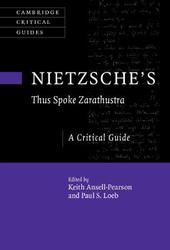
|
Nietzsche's 'Thus Spoke Zarathustra': A Critical Guide
Hardback
Main Details
Description
Nietzsche regarded Thus Spoke Zarathustra as his most important philosophical contribution because it proposes solutions to the problems and questions he poses in his later books - for example, his cure for the human disposition to vengefulness and his creation of new values as the antidote to nihilism. It is also the only place where he elaborates his concepts of the superhuman and the eternal recurrence of the same. In this Critical Guide, an international group of distinguished scholars analyze the philosophical ideas in Thus Spoke Zarathustra, discussing a range of topics that include literary parody as philosophical critique, philosophy as a way of life, the meaning of human life, philosophical naturalism, fatalism, radical flux, human passions and virtues, great politics, transhumanism, and ecological conscience. The volume will be invaluable for philosophers, scholars and students interested in Nietzsche's thought.
Author Biography
Keith Ansell-Pearson is Professor of Philosophy at the University of Warwick. Paul Loeb is Professor of Philosophy at the University of Puget Sound.
Reviews'In Ecce Homo, Nietzsche writes that Thus Spoke Zarathustra is the 'greatest gift' humanity has ever received-the 'most elevated book' with a 'voice that spans over millennia.' Despite this, anglophone Nietzsche scholars have been somewhat reluctant to engage with the work he took to be his true masterpiece. So we should thank Keith Ansell-Pearson and Paul Loeb for putting together this intriguing collection of essays entirely dedicated to Thus Spoke Zarathustra. Their volume advances the debate on several fronts. On the one hand, it approaches the thought of eternal recurrence-central not only to Thus Spoke Zarathustra, but to Nietzsche's thought as such-from new angles. On the other hand, and perhaps more surprisingly, it shows that Thus Spoke Zarathustra is also an essential work when it comes to aspects of Nietzsche's thought such as his views on naturalism, moral psychology, pessimism, the will to power, and the meaning of philosophy itself.' Mattia Riccardi, Assistant Professor of Philosophy, University of Porto
|